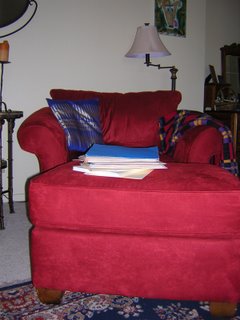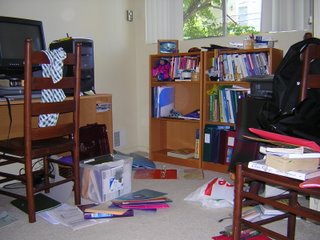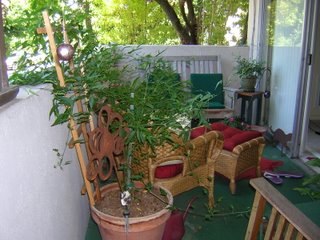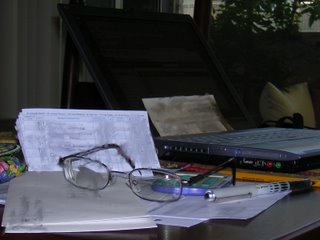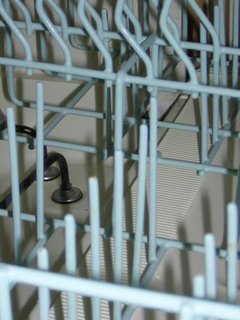The following is an email I received yesterday from my friends in Thailand, explaining their perspective of the coup:I hate to send "mass emails", but please forgive me this one. So many have written asking about our health and well-being in Thailand with the "Coup" and all, along with the occasional "what the F- is going on over there?" question, I thought I'd write it all at once.
I have to start by turning back the clock a bit... The current PM, Taksin, came to office a bit over 5 years ago in a landslide election. He's filthy rich. At that time, he was #2 in Asia behind his do-nothing son, to whom he divested enough of his assets so he could qualify for Thai politics without "conflict of interest" (cough cough).
To this day, or at least, to yesterday, he maintained widespread support in the countryside inspired by his very popular populist give-aways. He instituted a "75 cents cures all diseases" program which bankrupted the rural hospitals and means they are now all run without doctors. He instituted a "village loan program" which promised every village $25,000 to disburse as they pleased (only later saying "of course, it's just a loan”). Most of the money went to buying consumer goods and the loans have mostly defaulted. He gave away a lot of "free cash" at polling time, no receipt required.
However, city folks caught on quick, as did the academia and the military. Soon after he won another landslide election for a second term, people started making noises about how he was, essentially, shaping Thai business law so that he could own everything from the national oil and electric companies, to the entire telecom sector, to all agricultural exports, to all media outlets.
Demonstrations picked up around the privatization of the electric utility. The courts said the process was not transparent and "rigged" from the beginning. This emboldened the protesters, who started to push on the reduced press freedoms that had been put in place over the previous four years.
The shoe really dropped when he changed the foreign corporation ownership law to allow 49% foreign ownership of telecom, then promptly signed a deal to sell his telecom company to Singapore and a group of Thai shareholder nominees, for a total of USD 1.9 billion. His paper profit was over USD 700 million. And, by doing it through off-shore entities and his children, he made it a totally Tax-Free transaction.
The demonstrations were huge and long. He said he wouldn't resign unless the King whispered in his ear. The king whispered many times in cloaked public statements, but it turned out that the PM had a hearing problem. So, the King called him summarily to his Palace in Hua Hin and took the opportunity to whisper a bit more loudly. This time the PM heard him, and dissolved the government.
Now, the Thai political system is a parliamentary one. So, while the next election is prepared, the PM resigns, names an administrator as acting PM, and the government takes on a caretaker role. That is, it signs checks and transacts whatever business is required to keep the country running, without making any new initiatives, passing new laws (except as relates to budget resolutions required to keep things running), signing treaties, etc.
The PM called a snap election for 30 days later. Only one problem. The Thai constitution requires 90 days for politicians to register with a political party. That means, no new faces could run, and no one could change parties. The opposition parties unanimously boycotted the election.
This created a small problem for the PM, and he used money to solve it. The Thai constitution requires that a candidate running in an uncontested constituency receive 50% of the ELIGIBLE vote. That's a lot in Thailand, because anyone over 18 and not dead is eligible to vote. In some constituencies, the dead still make up 10% or more of the votes too.
However, if you run contested, you only need a simple majority of 20% of the eligible voters. So, the PM set up sham parties and funded them to run against his candidates. Well, even the PM controlled courts couldn't swallow that one. They annulled the election and threw three of the election commissioners in jail for 6 years apiece.
Meanwhile, our Merry PM kept on running the country as if his was a real government, not a caretaker one. He never appointed an administrator, he issued executive decrees creating new laws, he signed treaties, and he gave civil servants a 15% raise to thank them for their support. The guy had balls, that's for sure.
He called an election for 10/15, but his election commissioners turned out to be similar crooks to the last ones. Everyone said it was going to be more of the same. He started making noises about maybe not being PM after the election, but just head of the party. Yeah, right. Did it matter? He had stacked the constitutional court, the election commission, the police department hierarchy, the bank board, the telecom commission, the anti-corruption commission, and got blanket permission from his party-controlled parliament to call a state of emergency whenever he thought fit.
The last timber in the log cabin he was building was the military. He saw it was time to make his big move to get out anyone in the military that opposed him, and put in his cronies. That didn't sit well with the power brokers in the military, especially since the military here reports to the King, not to the PM's office, and the King is not very happy with Mr. Taksin.
Yesterday morning, Taksin called a teleconference meeting of all the heads of the military at 8am Thailand time. He was in New York. The meeting was suppose to announce the final "reshuffle", and then be followed by a cabinet meeting. None of the military chiefs showed up for the meeting. When the cabinet meeting concluded at noon, it was pretty clear the cabinet knew what the no-show meant, even if Mr. T didn't get it. Half of the cabinet left for Singapore. Some went as far as France. The poorer ones went to Cambodia or fled upcountry.
At three o'clock, Gen. Prem, who, at 86 is the retired "moral" authority of the military, went to have tea with the King. It was supposedly to discuss funeral arrangements for one of their mutual friends. Yeah, right.
About that time, the PM ordered M-16 rifles to be issued to 180 special unit police officers, and he deployed them to his Bangkok residential compound. His son and daughter fled the country about the same time.
At about 6pm, Gen. Sonthi, who was later to lead the coup, entered the Chitralada Palace and stayed about 30 minutes. It is not known if he saw the King while he was there.
About 9pm, the military-run television station stopped airing programs and started playing patriotic songs (from the hit video "60 Years of the King"). A bit after that, Taksin tried to declare a state of emergency over the foreign ministry contolled channel 9. He was cut off in the middle and replaced with the same music.
About 50 soldiers were dispatched to Taksin's compound. The 180 police waved goodbye as they headed home and left the house to the soldiers.
By 10pm, all the TV and radio stations were under control of the military, as was Parliament, Government House, and all key points in Bangkok. By 11 pm the coup was essentially over, and a short announcement was made.
At 1am, the coup leaders and all the military chiefs were received by the King, and they stayed at the Palace until 4am.
At 9am, the coup leaders with all the military chiefs made an announcement that the old government was gone, that a civilian government would be named within two weeks, and that the first task would be to close the loopholes in the constitution which allowed the PM's rampant election and business corruption to succeed so effectively. After that (about one year?) there would be an election.
Essentially, the Taksin government had resigned but refused to quit. So, the military folks helped show them the door. Since there is no chance of a fair election taking place under current conditions, the King will name a new civilian government to set up the next set of elections. This is a procedure provided for in the Thai constitution.
All in all, this is a good thing for Thailand. I think I can fairly say that the military coup was no more "extra-constitutional" than the PM's resigned-but-not-quit government.
Boring enough! Kudos if you got this far. There will be pop quiz after recess! Thanks again for your concern, and I'll write again soon.
My note: Yesterday's Chronicle ran an article on the coup with the headline: Coup Stuns Thailand. Yet a picture alongside the article showed Thai citizens snapping pictures of the military and smiling (as though it were a party). Another picture showed a man offering a Thai soldier a flower. Folks didn't seem "stunned" at all. Hmmmm... I also read an online article in which some muckety-muck from Australia deplored the coup as an assault on democracy. Hmmmm again..just because you call something a democracy don't mean it is. Takes more than "free elections" to be a democracy. (I will try to track down links for the aforementioned articles and post them later.)















